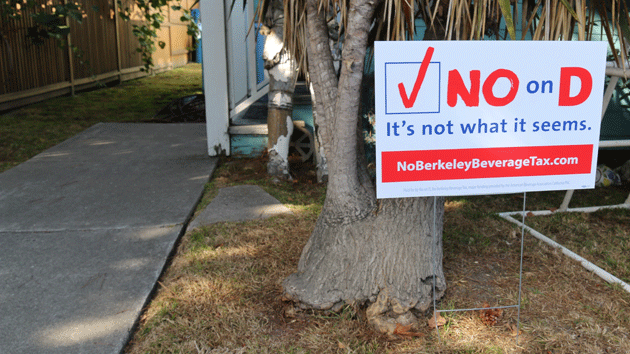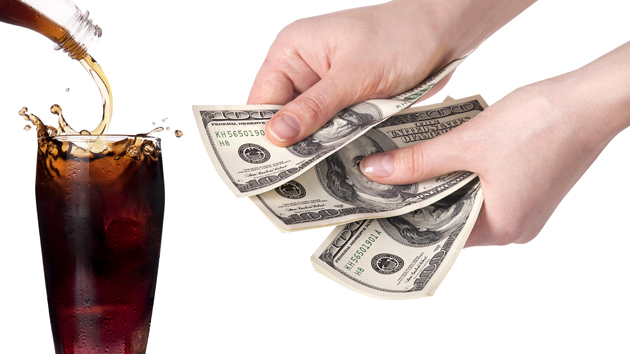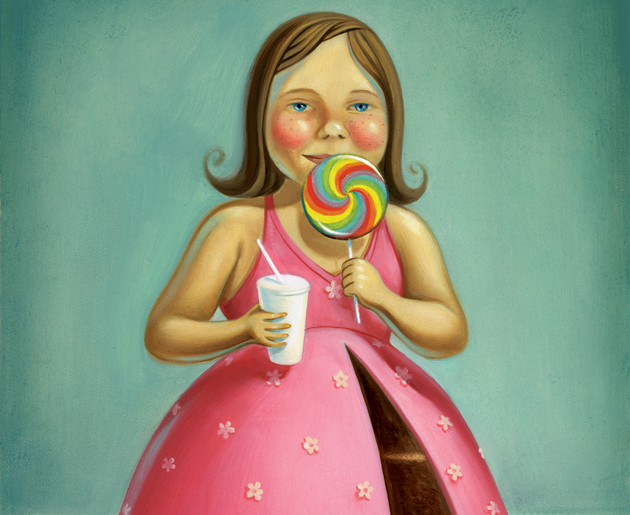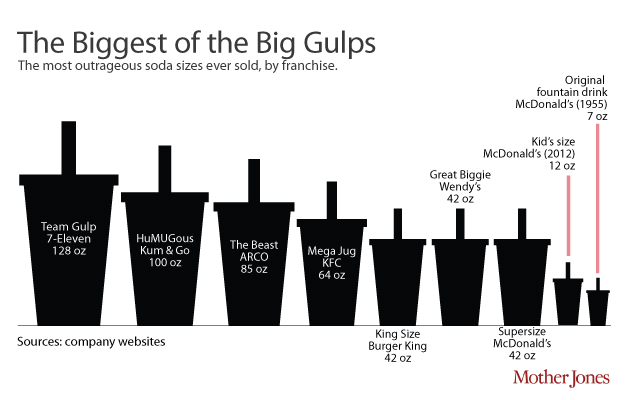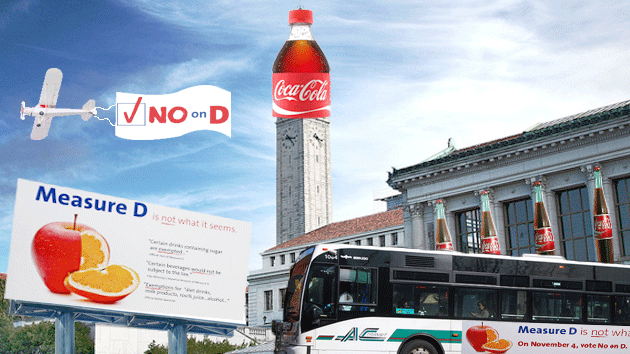
Photoillustration by Josh Harkinson with <a href="https://www.flickr.com/photos/brainchildvn/2280342987/in/photolist-4tvmwp-oyAFf-9hgPm-iHiKn-kRbwP-izLdf-dKvSpT-oAQMY-9vVSm-m9Aio-9sk3x-7a5FcV-bCAogR-7a9r1J-35zZqj-bzwEo-7a5yRv-mkL9T-iik1nU-bEhki-7AZVk6-7ARhZ3-7a9iP5-7B4HpG-7B1cnE-7a5yGt-7BaZJH-7a5udZ-7a5RJM-bCkv7k-aqNv7-burFRh-7a5yZc-77C6RW-77yaJM-77yaFT-77yaNB-77C6Zj-77y9VR-77C6Vu-kAKB9-rsp6H-9nCXqH-m6f8e-anfpa-8TyCxb-7h1R13-7TRqG4-svcim-bpHzm5">Charlie Nguyen</a>/Flickr, <a href="https://www.flickr.com/photos/pfsullivan_1056/5713020673/in/photolist-9GQJ1r-cCW5BN-kSrjBH-digmdJ-9Ab3ig-7UrPER-7VWHYJ-ogyzLg-8vz15K-7Zw2RT-8seMjm-7VTqie-8gWYdd-86ukcV-i2vuoi-94P8cG-corHPC-8zwhic-j6qzFZ-95ppYm-cSihFo-9FEBEH-ej9u4v-9Gihjp-cNzX5s-o9oRNw-9F6FcF-g7vAdZ-6BfU4P-kYtKDf-p8qqpj-eTAgLr-imCb4q-81d1g4-6Bk4TG-6BfRDn-6BfSeK-7V4xqi-8aDsBq-7VEEiD-88ZPyB-8cuzFc-8eXirG-9q6MXo-86ui8R-pdxp3B-82w7ER-87Bgwx-ixMcGt-85c3P4">Charlie Sullivan</a>/Flickr and Shutterstock
In a couple of weeks, residents of Berkeley, California, will decide whether or not to place a penny-an-ounce tax on sugary beverages such as sweetened teas and sodas. The beverage industry has fought off similar taxes and restrictions in every American city where they’ve been proposed, but it has never faced a more formidable challenge than it does in this overwhelmingly liberal and well-educated college town.
Early polls show almost two-thirds of Berkeley residents favoring the tax proposal, known as Measure D. If Big Soda can defeat a tax here, the thinking goes, it can defeat one anywhere. Yet if the industry loses, the momentum could swing to the nutritionists and health advocates who’ve argued for years that sugar-packed foods and sugary drinks are the smoking guns in our diabetes and obesity epidemics—despite decades of campaigning by the sugar industry to make us believe otherwise. (A new study suggests that drinking a 20-ounce soda daily can age your cells as much as smoking does.)
To date, beverage companies have poured an astounding $1.7 million into derailing this small-city measure, more than $21 per registered voter. With No on D ads flooding local TV and radio broadcasts, newspapers, bus stops, light-rail stations, and residential doorknobs—not to mention all the mailers and handouts from paid canvassers, it can feel like the whole city is under invasion by a propaganda machine. The soda fight is, if nothing else, a case study in whether truckloads of cash can sway a politically engaged citizenry.
Rather than defend the merits of sugary beverages or even question the point of taxing them, the ads seem designed to confuse voters and breed cynicism about how the money will be spent. I snapped some photos of the advertising around town and asked the measure’s outgunned campaign to respond to some of the claims.
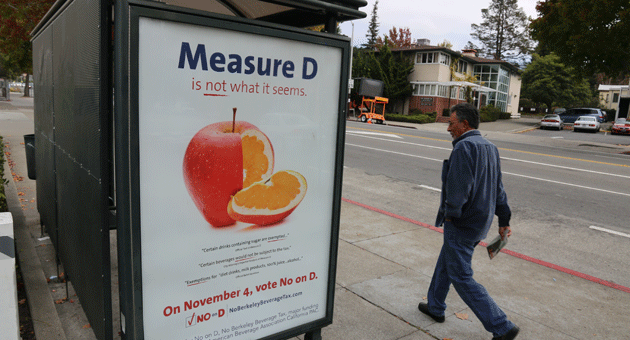
Anti-Measure D ads appear on numerous Berkeley bus shelters. Clear Channel Outdoor, which handles the advertising did not return a call seeking information about their cost and placement.
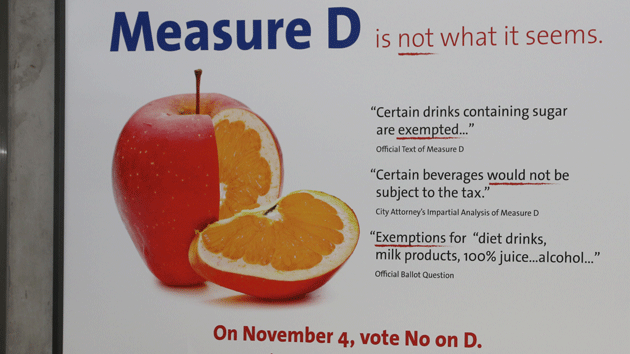
According to Sara Soka, the campaign manager for Berkeley vs. Big Soda, as the pro-D campaign is known, milk products and 100% fruit juice were exempted due to their nutritional value. Soda, on the other hand, is just empty calories. “It’s not like kids are walking around and drinking milkshakes,” Soka says. Liquid sweeteners added to coffee drinks are taxed. Alcohol is exempted because it’s already taxed. Diet drinks, while not exactly good for you, also aren’t strongly linked to diabetes or obesity.
Two of Berkeley’s three BART stations, I discovered, were awash with ads opposing the measure. According to Berkeleyside, a local news site, the No campaign has spent $46,750 on the BART ads alone. Here are more shots at the North Berkeley station.
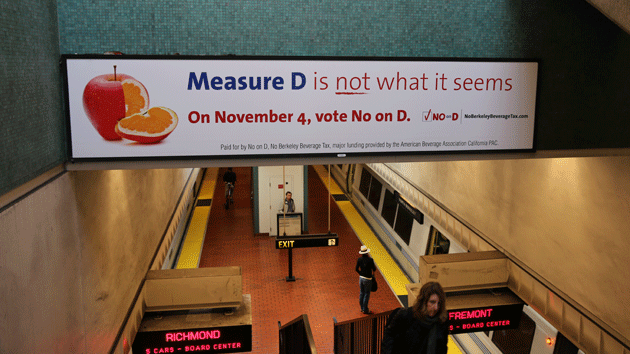
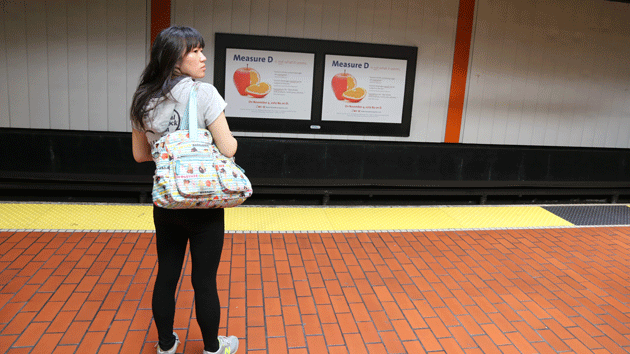
Outside of the station, I ran into these paid canvassers, who hightailed it once I told them I was a reporter and started snapping some photos. (They said they weren’t allowed to talk to the media.)
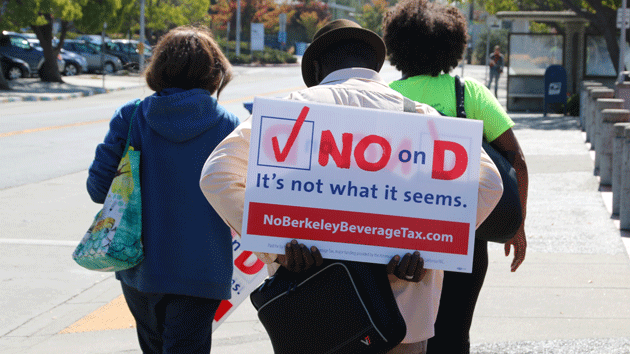
But before I outed myself as a reporter, I wanted to hear their pitch to voters firsthand. Here’s a short clip from my chat with one canvasser. (The background music is coming from his cell phone).
One of the reasons he said I should vote against the measure—I’m actually an Oakland resident, so I can’t vote on it either way—is that it would hurt local businesses and the poor. Now it’s conceivable that someone going on a big soda run might pop over the border to avoid the tax, but it’s hard to imagine that anyone grabbing a drink at the local convenience store would bother.
As for whether the tax would hurt the poor, Soka of Berkeley vs. Big soda argues that the tax was in fact designed to help low-income people by reducing the obesity epidemic that disproportionately affects the poor and people of color. And while some people may not like the nanny-state aspect of that, Measure D has been endorsed by the NAACP and Latinos Unidos. If the measure’s opponents “were truly concerned about communities of color or low-income communities,” Soka said, “they would stop using them as a target.”
Here are some flyers the canvassers were handing out:
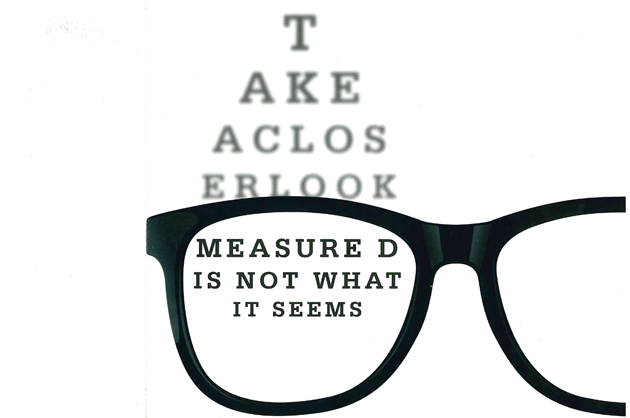
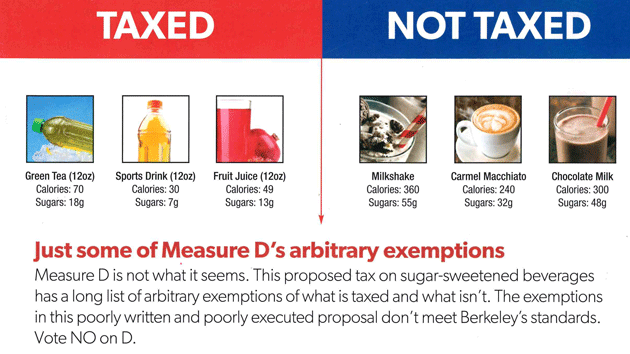
The fairness factor is always a nice argument. The irony, though, is that soda interests used nearly the opposite critique to defeat a soda-tax proposal in nearby Richmond two years ago. The wording of the Richmond proposal did not explicitly exclude certain beverages, such as soy milk and baby formula. So “they immediately attacked us saying that we were going to tax that,” recalls Jeff Ritterman, who led the Richmond effort. And although the city attorney clarified that the tax would indeed exempt those drinks, the industry’s campaign firm kept using the bogus claims, right up through Election Day.
Over at the Ashby BART station, which was covered completely in anti-Measure D ads, I encountered still more canvassers.
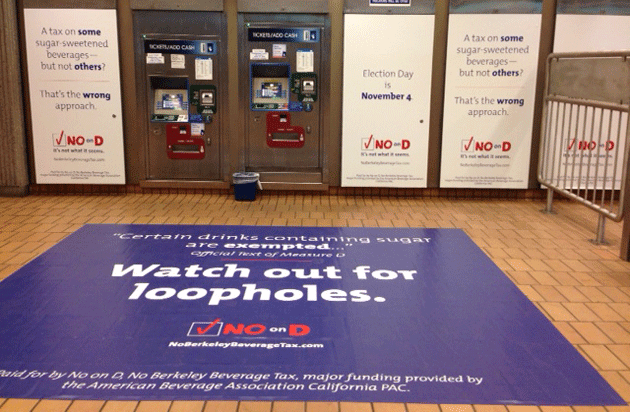
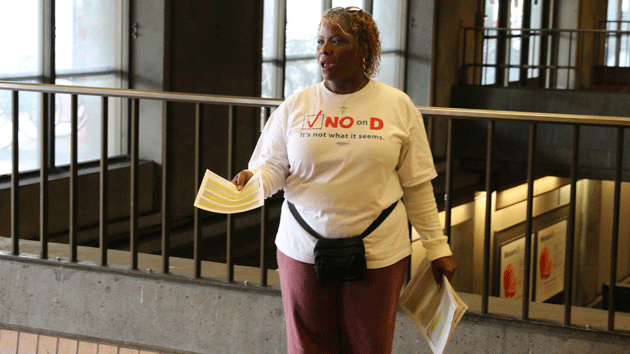
They were handing out the following leaflet…
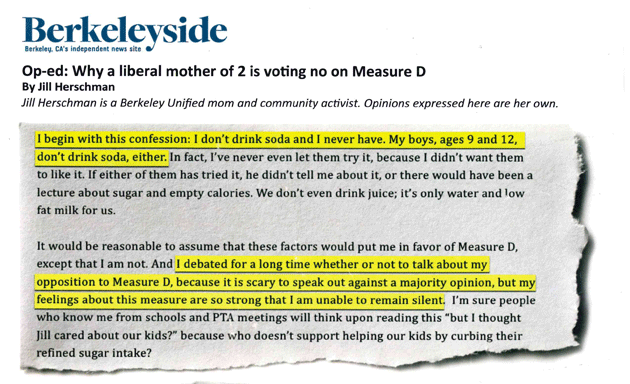
Berkeleyside has found it necessary to respond to the prominent use of its logo: “Many Berkeley residents have been confused by that literature, and have asked Berkeleyside whether the news site has taken a position to oppose Measure D,” the publication noted in an article about the flyers. “Berkeleyside does not take editorial positions. The flyer is a production of the No on Measure D campaign.”
In fact, most of the relevant op-eds on the site support Measure D. But Big Soda has spent almost $10,000 placing ads on Berkeleyside, and tens of thousands more on similar ads in most local publications. Here’s a two-page spread in the East Bay Express, which also has covered the fight.
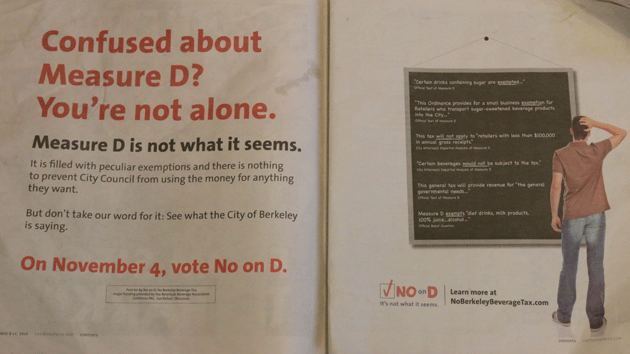
The measure’s opponents have also spent at least $327,000 running this TV ad on at least two local stations:
The argument about the tax receipts going into Berkeley’s general fund instead of being earmarked for, say, nutrition programs—a pitch I also heard from the canvasser—is misleading at best, the soda-tax proponents say. There’s a reason it’s not earmarked: Under California law, you need a two-thirds majority to pass a local ordinance that earmarks tax money for a specific use. (One reason why a similar proposal in San Francisco is far less likely to pass.) Measure D, Soka informs me, would direct the Berkeley City Council to appoint a panel of experts with backgrounds in nutrition and education to determine how to spend the money. And it’s almost a given that the cash would go toward health and education programs for low-income communities.
Even if they don’t watch TV, use public transit, or read local newspapers, Berkeleyans can hardly avoid these:
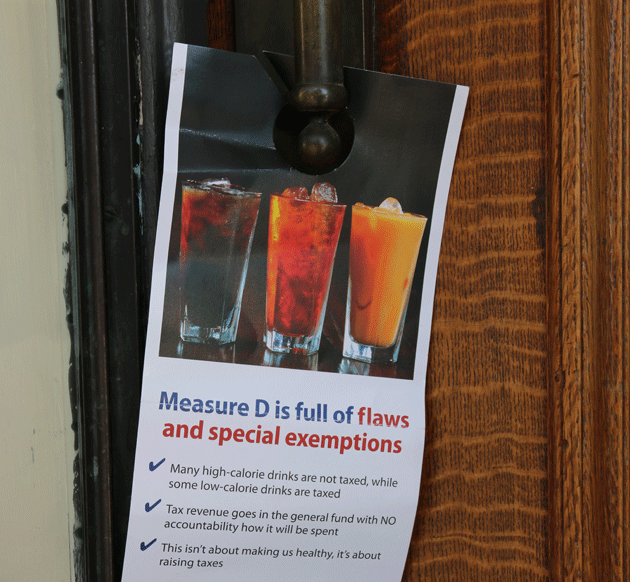
Foes of the Measure D also have done at least seven mass mailings, defined as mailings targeting more than 200 households. Here’s one mailer:
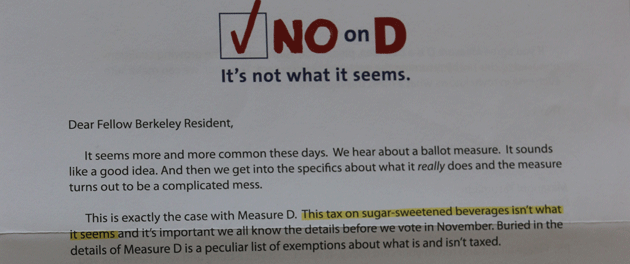
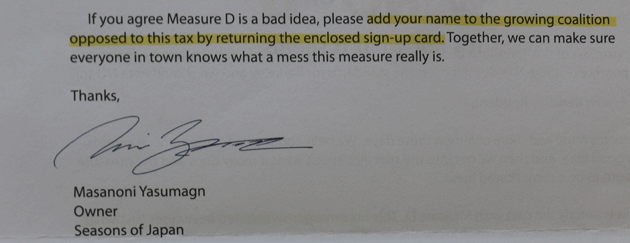
The White Pages doesn’t show anybody named Masanoni Yasumagn living in Berkeley. But they do list a very similarly named resident, Masanori Yasunaga, who happens to be the CEO of Calbee, Inc.—the “second largest snack company in the world.”
Here’s another mailer. What is this woman thinking? If she were an actual Berkeley resident, she might be wondering why she’s getting so many anti-Measure D mailers.

Until recently, there were a lot more signs around town like the one below. But that was before the city sent out two letters warning the campaigns that it’s illegal to place yard signs on public property. Now No on D yard signs can only be found in actual yards—which is to say, not many can be found. After driving all over town one morning, this was the only one I saw, and only after I asked Sara Soka where I might find one.
